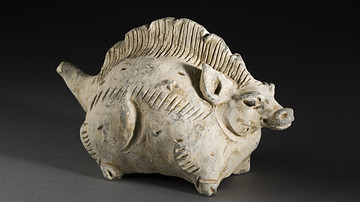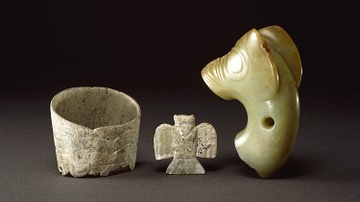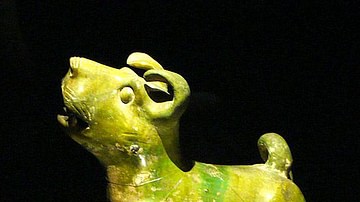Search
Search Results

Article
Most Popular Gods & Goddesses of Ancient China
There were over 200 gods and goddesses worshipped throughout ancient China, but if one were to count every deity or spirit, the number would be over 1,000. Each town, village, city, field, farm, and sometimes even separate plot in a graveyard...

Article
Crossbows in Ancient Chinese Warfare
The crossbow was introduced into Chinese warfare during the Warring States period (481-221 BCE). Developing over the centuries into a more powerful and accurate weapon, the crossbow also came in versions light enough to be fired with one...

Article
Pigs in Ancient China
Pigs (sometimes called “suids” of the suidae family) have long played an important part in Chinese culture. Pigs symbolize good fortune and happiness as they seem to live a care-free existence and have a long relationship with the humans...

Image
Chinese Pig-Dragon Sculpture
A Chinese pig-dragon sculpture. China, probably Yunnan Province, Yuan dynasty, 1279-1368.
Los Angeles County Museum of Art.

Article
Religion in Ancient China
Religious practices in ancient China go back over 7,000 years. Long before the philosophical and spiritual teachings of Confucius and Lao-Tzu developed or before the teachings of the Buddha came to China, the people worshipped personifications...

Article
Chinese Lacquerware
Lacquer was a popular form of decoration and protective covering in ancient China. It was used to colour and beautify screens, furniture, bowls, cups, sculpture, musical instruments, and coffins, where it could be carved, incised, and inlaid...

Article
Daily Life in Ancient China
Daily life in ancient China changed through the centuries but reflected the values of the presence of gods and one's ancestors in almost every time period. Villages like Banpo show evidence of a matriarchal society, where there was a priestly...

Image
Chinese Jade Pig-Dragon, Owl & Hair Ornament
A jade hair ornament (?), owl figurine and pig-dragon. Hongshan Culture, c. 3,500 BCE. From Liaoning Province, China. (British Museum, London)

Article
Dogs in Ancient China
Dogs are the oldest domesticated animal in China and were bred as guardians, for transporting goods, for herding, hunting, and as a food source. Archaeological evidence dates the domestication of the dog in China at approximately 15,000 years...

Article
Swords in Ancient Chinese Warfare
Although the bow and crossbow were the weapons of choice for much of China's history, the sword played its part, especially when warriors were forced to dismount and face the enemy at close quarters. Widely used from around 500 BCE, swords...